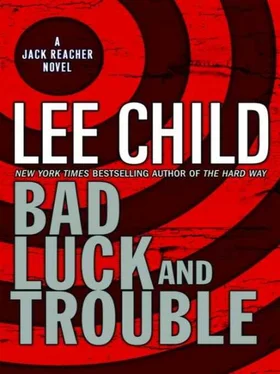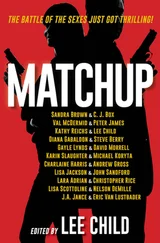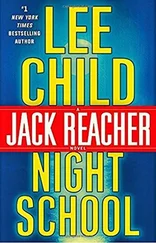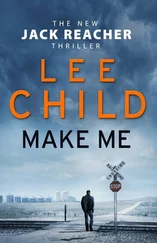Wright said to Neagley, “I was with the FBI, once upon a time.”
Reacher asked him, “Did you know Manuel Orozco and Jorge Sanchez?”
“Did I?” Wright said. “Or do I?”
“Did you,” Reacher said. “Orozco’s dead for sure, and we figure Sanchez is, too.”
“Friends of yours?”
“From the army.”
“I’m very sorry.”
“We are, too.”
“Dead when?”
“Three, four weeks ago.”
“Dead how?”
“We don’t know. That’s why we’re here.”
“I knew them,” Wright said. “I knew them pretty well. Everyone in the business knew them.”
“Did you use them? Professionally?”
“Not here. We don’t contract out. We’re too big. Same with all the larger places.”
“Everything’s in-house?”
Wright nodded. “This is where FBI agents and police lieutenants come to die. We get the pick of the litter. The salaries on offer here, they’re lining up out the door. Not a day goes by that I don’t interview at least two of them, on their last vacation before retirement.”
“So how did you know Orozco and Sanchez?”
“Because the places they look after are like training camps. Someone gets a new idea, they don’t try it out here. That would be crazy. They perfect it someplace else first. So we keep people like Orozco and Sanchez sweet because we need their advance information. We all hook up once in a while, we talk, conferences, dinners, casual drinks.”
“Were they busy? Are you busy?”
“Like one-armed paperhangers.”
“You ever heard the name Azhari Mahmoud?”
“No. Who is he?”
“We don’t know. But we think he’s here under an alias.”
“Here?”
“Somewhere in Vegas. Can you check hotel registrations?”
“I can check ours, obviously. And I can call around.”
“Try Andrew MacBride and Anthony Matthews.”
“Subtle.”
Dixon asked, “How do you guys know if a card player is cheating?”
Wright said, “If he’s winning.”
“People have to win.”
“They win as much as we let them. Any more than that, they’re cheating. It’s a question of statistics. Numbers don’t lie. It’s about how, not if.”
O’Donnell said, “Sanchez had a piece of paper with a number written on it. Sixty-five million dollars. A hundred grand, times six hundred and fifty separate occasions, over a four-month period, to be precise.”
“So?”
“Are those the kind of numbers you would recognize?”
“As what?”
“As a rip-off.”
“What’s that in a year? Almost two hundred million?”
“Hundred and ninety-five,” Reacher said.
“Conceivable,” Wright said. “We try to keep wastage below eight percent. That’s like an industry target. So we lose way more than two hundred million in a year. But having said that, two hundred million in one specific scam would be a hell of a large proportion all in one go. Unless it was something new, over and above. In which case our eight percent target is shot all to hell. In which case you’re starting to worry me.”
“It worried them,” Reacher said. “We think it killed them.”
“It would be a very big deal,” Wright said. “Sixty-five million in four months? They’d need to recruit dealers and pit bosses and security people. They’d need to jinx cameras and erase tapes. They’d have to keep the cashiers quiet. It would be industrial-scale scamming.”
“It might have happened.”
“So why aren’t the cops talking to me?”
“We’re a little ways ahead of them.”
“The Vegas PD? The Gaming Board?”
Reacher shook his head. “Our guys died across the line, in LA County. Couple of sheriffs out there are dealing with it.”
“And you’re ahead of them? What does that mean?”
Reacher said nothing. Wright was quiet for a beat. Then he looked at each face in turn. First Neagley, then Dixon, then O’Donnell, then Reacher.
“Wait,” he said. “Don’t tell me. The army? You’re the special investigators. Their old unit. They talked about it all the time.”
Reacher said, “In which case you understand our interest. You worked with people.”
“If you find something, will you cut me in?”
“Earn it,” Reacher said.
“There’s a girl,” Wright said. “She works in some awful place with a fire pit. A bar, near where the Riviera used to be. She’s tight with Sanchez.”
“His girlfriend?”
“Not exactly. Maybe once. But they’re close. She’ll know more than I do.”
Wright went back to work and Reacher checked with the concierge as to where the Riviera had been. He got directions back to the cheap end of the Strip. They walked. It was a warm dry desert night. The stars were out, on the far horizon, beyond the pall of smog and the wash of the streetlights. The sidewalks were matted with discarded full-color postcards advertising prostitutes. It seemed like the free market had driven the base price down to a penny under fifty bucks. Although Reacher had no doubt that sum would inflate pretty fast once some hapless punter actually got a girl to his room. The women in the pictures were pretty, although Reacher had no doubt they weren’t real. They were probably library shots of innocent swimsuit models from Rio or Miami. Vegas was a city of scams. Sanchez and Orozco must have been permanently busy. Like one-armed paperhangers , Wright had said, and Reacher was completely ready to believe him.
They got level with the peeling cement bar with the cheap beer and the dirty girls and turned right into a mess of curving streets flanked by one-story tan stucco buildings. Some were motels, some were grocery stores, some were restaurants, some were bars. All had the same kind of signs, white boards behind glass on tall poles, with horizontal racks for slot-in black letters. All the letters were in the same pinched vertical style, so it required concentration to tell one type of establishment from another. Groceries advertised six-packs of soda for $1.99, motels boasted about air and pools and cable, restaurants had all-you-can-eat breakfast buffets twenty-four hours a day. The bars majored on happy hours and permanent low prices for well shots. They all looked the same. They walked past five or six before they found one with a sign that said: Fire Pit .
The sign was outside a plain stucco shoe box short on windows. It didn’t look like a bar. It could have been anything at all. It could have been an STD clinic or a fringe church. But not inside. Inside it was definitely a Vegas bar. It was a riot of décor and noise. Five hundred people drinking, shouting, laughing, talking loud, purple walls, dark red banquettes. Nothing was straight or square. The bar itself was crowded and long and curved into an S-shape. The tail of the S curled around a sunken pit. In the center of the pit was a round fake fireplace. The flames were represented by jagged lengths of orange silk blown upright by a hidden fan. They swayed and moved and danced in beams of bright red light. Away from the fire the room was divided into plush velvet booths. All the booths were full of people. The fire pit was packed. People were standing everywhere. Music played from hidden speakers. Waitresses in abbreviated outfits threaded expertly through the crowds with trays held high.
“Lovely,” O’Donnell said.
“Call the taste police,” Dixon said.
“Let’s find the girl and take her outside,” Neagley said. She was uncomfortable in the press of people. But they couldn’t find the girl. Reacher asked at the bar for Jorge Sanchez’s friend and the woman he was talking to seemed to know exactly who he meant but said she had gone off duty at midnight. She said the girl’s name was Milena. For safety’s sake Reacher asked two of the waitresses the same question and got the same answers from both of them. Their colleague Milena was tight with a security guy called Sanchez, but she was gone for the night, home, to sleep, to get ready for another hard twelve-hour shift the next day.
Читать дальше












